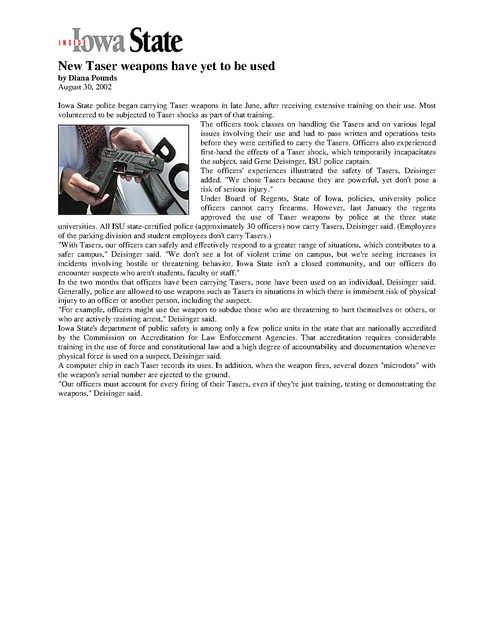Taser New Weapons Yet to Be Used Ia State 2002
Download original document:

Document text

Document text
This text is machine-read, and may contain errors. Check the original document to verify accuracy.
II ~3Wa State New Taser weapons have yet to be used by Diana Pounds August 30, 2002 Iowa State police began carrying Taser weapons in late June, after receiving extensive training on their use. Most volunteered to be subjected to Taser shocks as part of that training. The officers took classes on handling the Tasers and on various legal issues involving their use and had to pass written and operations tests before they were certified to carry the Tasers. Officers also experienced first-hand the effects of a Taser shock, which temporarily incapacitates the subject, said Gene Deisinger, ISU police captain. The officers' experiences illustrated the safety of Tasers, Deisinger added. "We chose Tasers because they are powerful, yet don't pose a risk of serious injury." Under Board of Regents, State of Iowa, policies, university police officers cannot carry firearms. However, last January the regents approved the use of Taser weapons by police at the three state universities. All ISU state-certified police (approximately 30 officers) now carry Tasers, Deisinger said. (Employees of the parking division and student employees don't carry Tasers.) "With Tasers, our officers can safely and effectively respond to a greater range of situations, which contributes to a safer campus," Deisinger said. "We don't see a lot of violent crime on campus, but we're seeing increases in incidents involving hostile or threatening behavior. Iowa State isn't a closed community, and our officers do encounter suspects who aren't students, faculty or staff." In the two months that officers have been carrying Tasers, none have been used on an individual, Deisinger said. Generally, police are allowed to use weapons such as Tasers in situations in which there is imminent risk of physical injury to an officer or another person, including the suspect. "For example, officers might use the weapon to subdue those who are threatening to hurt themselves or others, or who are actively resisting arrest," Deisinger said. Iowa State's department of public safety is among only a few police units in the state that are nationally accredited by the Commission on Accreditation for Law Enforcement Agencies. That accreditation requires considerable training in the use of force and constitutional law and a high degree of accountability and documentation whenever physical force is used on a suspect, Deisinger said. A computer chip in each Taser records its uses. In addition, when the weapon fires, several dozen "microdots" with the weapon's serial number are ejected to the ground. "Our officers must account for every firing of their Tasers, even if they're just training, testing or demonstrating the weapons," Deisinger said.

